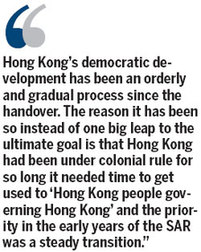Sincerity on universal suffrage
Updated: 2013-12-06 06:42
By Tu Haiming(HK Edition)
|
|||||||
Li Fei, deputy general secretary of the National People's Congress Standing Committee (NPCSC) and director of the Hong Kong SAR Basic Law Committee of the NPCSC, discussed universal suffrage several times during his visit here last month. He expressed the hope that Hong Kong people should put aside their differences and respect, understand and accept one another. Then a consensus can be reached over how universal suffrage should be implemented to take the city's democratic development to a new level. The views and analyses Li presented during his stay here make it clear the central government is totally committed to introducing universal suffrage in the HKSAR with absolute sincerity.
Public debates on how universal suffrage should be implemented have been going on for a while in Hong Kong. The SAR government is expected to officially start the public consultation on the next stage of constitutional reform later this month. It will be a process of communication as well as of building consensus. It is time for Hong Kong residents to discard any lingering doubts about the central authorities' sincerity and focus on reaching agreement over the progress toward universal suffrage.
Hong Kong's democratic development has been an orderly and gradual process since the handover. The reason it has been so instead of one big leap to the ultimate goal is that Hong Kong had been under colonial rule for so long it needed time to get used to "Hong Kong people governing Hong Kong" and the priority in the early years of the SAR was a steady transition. Democracy is the common desire of all members of society. It is meant to facilitate people's pursuit of a happy life. If the democratic progress is rushed, various parties and interest groups will most likely find themselves fighting one another for a dominant position and become enemies at the expense of social stability and ordinary citizens' well-being. That is not what democracy is for - rather it is the complete opposite. Many developing nations and former socialist countries can testify to the perils of "express democratization" with their own painful experiences. Some are still suffering the horrible consequences of a botched political transformation. Hong Kong must avoid making the same mistakes.

That is why Article 45 of the Basic Law stipulates that the method for selecting the Chief Executive (CE) shall follow the principle of proceeding orderly and gradually in accordance with Hong Kong's actual conditions. This is toward the ultimate goal of achieving CE elections by universal suffrage. It will be done with candidates nominated by a broadly representative nomination committee using democratic procedures.
This arrangement has proved beneficial to the interests of Hong Kong residents and foreign investors as well as the overall interests of Hong Kong society and the nation. In the past 16 years since the handover Hong Kong has successfully accomplished a steady transition and the "Hong Kong people governing Hong Kong" formula has matured to the point that there is reason to believe Hong Kong is now ready to implement CE elections by universal suffrage.
Democracy can only serve its purpose under the rule of law, without which it will easily run out of control and turn into a disaster. That is why democracy must proceed within the confines of the constitution everywhere in the world. The Basic Law serves as the constitutional safeguard of the Hong Kong SAR. The decisions of the NPCSC in 2004 and 2007 regarding Hong Kong's democratic development toward universal suffrage were made in accordance with the principle outlined in the Basic Law. The implementation of universal suffrage must follow the Basic Law and relevant decisions of the NPCSC. All parties concerned should reach a consensus on this point.
Hong Kong is not a sovereign state. It is a SAR of the People's Republic of China directly under the central government and enjoying unprecedented autonomy granted by that government. The winner of CE election must be approved by the central government to become CE of the HKSAR. The CE is accountable to the central government as well as to the HKSAR. That means anyone who is against the central government cannot be the CE. It is a "bottom line" that must not be crossed and all parties concerned should reach a consensus on it.
The author is permanent honorary president of the Hong Kong Federation of Overseas Chinese Associations, council member of the China Overseas Friendship Association and vice-chairman of the China Overseas Chinese Entrepreneurs Association. This is an excerpted translation of his article published in Wen Wei Po on Dec 3.
(HK Edition 12/06/2013 page9)